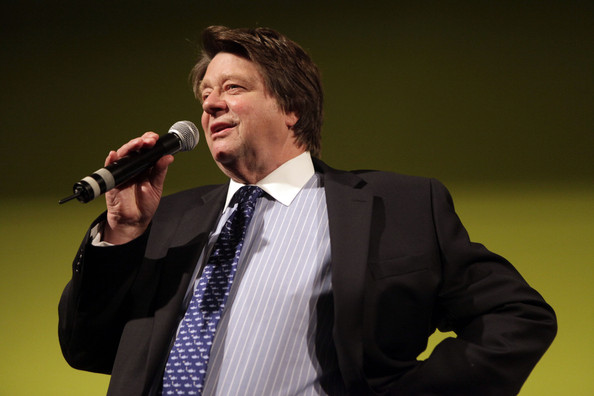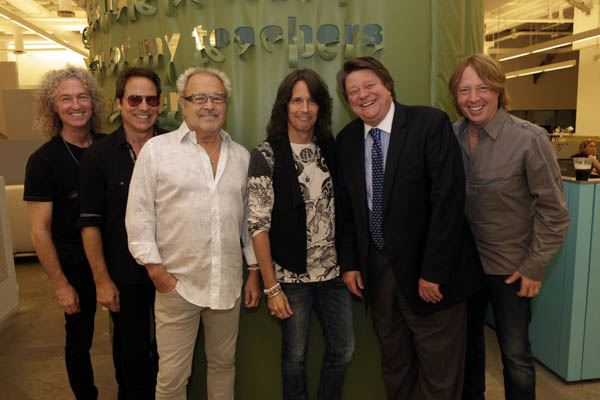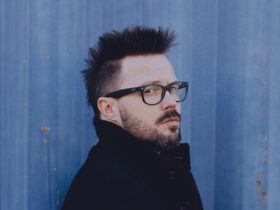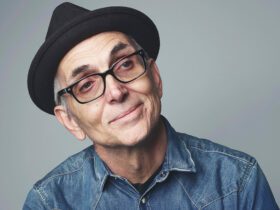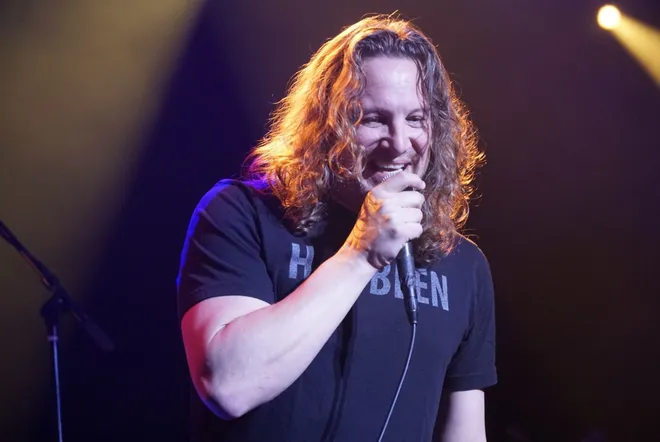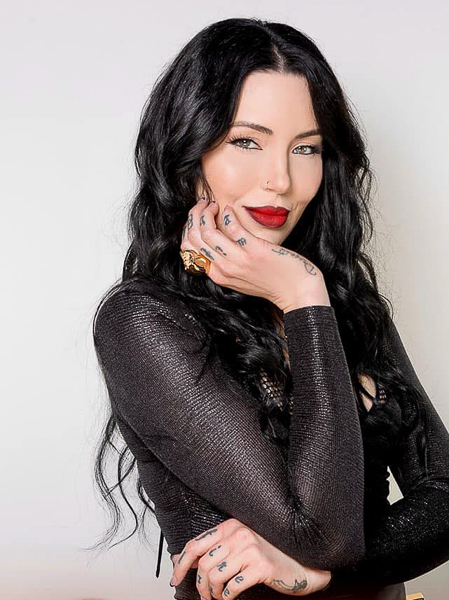We have enjoyed interviewing plenty of artists since our inception, but it’s a rare treat when you get to talk to someone who was present behind the scenes when iconic music was being made. A few years ago we talked to Harvey Goldsmith, who is one of the legendary promoters in the music business. On another occasion, we chatted with famed producer Eddie Kramer. Well, we have gone the extra mile to bring you an exclusive interview with a man who has seen it all and done it all. We are honored to bring you an interview with former Atlantic Records Vice President, Phil Carson. Phil is still in the business with his own venture Phil Carson & Associates. This includes managing the band Foreigner and artist Dee Snider. We spoke with him about about Foreigner and Dee Snider, but also his vast experiences with signing major bands like AC/DC, ABBA, The Firm, Twisted Sister, and The Honeydrippers to name just a few.
Phil had an extraordinary career at Atlantic Records and worked with both Ahmet and Nesuhi Ertegun. Phil elaborates on his relationship with both gentleman. We go back to the very beginning, asking how Phil chose music as his career path and what it was like playing with the legendry Dusty Springfield. Of course what is an interview with Phil Carson if you don’t bring up some Led Zeppelin road stories? Phil tells us about how he was able to join the band on stage not once, but twice to play with them. He discusses the where, the when and what songs he was able to play. Plus, will Phil confirm or deny the infamous mud shark story? See what his response is when I ask him about that.
In addition to all of this, Phil is very candid because he possesses such a wealth of musical history and knowledge. It is an interview we wished we had more time to conduct. However, we are very proud to present this rare, one-on-one chat session with the legendary Phil Carson!
Gus: We’re here at BackstageAxxess with a man rich in musical tradition, Phil Carson. Phil is a former touring musician with the legendary Dusty Springfield and he’s the former Senior Vice President of Atlantic Records. He was behind the signing and managing some of the biggest musical acts ever, like Led Zeppelin, ABBA, Foreigner, AC/DC, Twisted Sister and Motorhead just to name a few. Currently, Phil is spearheading his own business venture with Phil Carson & Associates. The management company is currently managing the band Foreigner. Phil, thank you for taking the time to talk to us today at BackstageAxxess.
Phil: It’s a pleasure. You said I was rich in musical history which is probably true. I wish I was rich in cash at the same time. The two don’t always go together (laughs).
Gus: I want to start off by going to the very beginning of your career in music. I want to know how you first got involved in the music industry. Was it you picking up an instrument? How did you get to first fall in love with music?
Phil: Well, suppose most kids and most people in the music business really get their start when they are in school. The senior boys at the school always had a little band. It’s a very long time ago, so that was the reason in those days. Our whole business was called skiffle. It was a cross between western swing and folk music. It was almost a unique summary that was so indigenous to England. There were not many American artists that played that style but there were other artists in England that did it and had some pretty major hits. That was a very, very long time ago in the galaxy far away.
Gus: (laughs) Well one of your first gigs was actually playing with the legendary Dusty Springfield. Tell us how that came about.
Phil: Well it’s a funny thing really. You know I was about to go into the career that I had planned. Believe it or not I wanted to be a rocket scientist and that plan warrants German so that I could speak. I read the books available on Wenher von Braun, Ronald Cooke and all those people and at the same time I’m playing in a semi pro little band. I was very fortunate with my grandmother, who was a show girl in her day, wanted me to have the best possible equipment. So there I was, a 17 year old kid and I had a Fender Precision bass and amplifier. Very few kids in England had that sort of gear. Well I was just mad for the vocal group that I was the bass player and I just applied myself to it. Well of course, the popular question was “What equipment have you got and do you know how to play it?” Of course, I immediately went to the top of the list and fortunately I could just about play so I got the job with the Springfields. That really started me off. There I was at the moment when the Springfields were just beginning to break. They’d already been to America. Not many people know this, but in fact the Springfields were the first British vocal group to have a hit on the Billboard charts in America. Even before the Beatles. A song called “Silver Threads & Golden Needles.” I didn’t play on the record but joined up with them soon after that and I toured with them for a while. That’s what started me off really.
Gus: How long did you play with Dusty?
Phil: Not very long. They broke up in 1963. I know she asked me to be the bass player for her group. She didn’t have a group, she was a solo artist. She asked me to become her bass player. I’d already agreed with one of the other guys in the Springfields that I would start a group with him. We never did a show. We did one demo record and that was the end of it but that guy was a chap called Mike Hurst, who went on to find some pretty major fame in the early 60s as record producer. He produced one of Cat Stevens’ early records.
Gus: I was going to ask you, how did you make the transformation from musician to record executive?
Phil: Well my family business was actually in supermarkets would you believe? After a couple of years as a musician they insisted that I put the guitar down and join a supermarket food chain. I did that. So I had two or three years, maybe four years, as it happens, outside of the music business. While I was in the supermarket chain I was headhunted by General Foods. I went into their Marketing Training Program which later stood me in very good state in the business side of things. I gravitated back into the music business by accident. It’s a rather boring story to tell exactly how that happened. I started working for a Swedish Record Label called Olga Records, which was the home to a couple of bands that became significant in my future. I’m sure you probably haven’t heard of them, but one was called Hep Stars and one was called the Hootenany Singers. One of the players in the Hep Stars was Benny Andersson and one of the guitarist and singers in the Hootenany Singers was Bjorn Ulvaeus. Of course they went on to form ABBA. After they recorded their first couple of songs, they got in touch with me. That was how I was able to bring them to Atlantic.
Gus: That was one of my questions about how you actually signed ABBA?
Phil: It was pure luck really and frankly if it were not for Jerry Greenburg, the President of Atlantic, ABBA would never have gone there. The guy sent me the record that they made and it was the one which was a Swedish entry to the EuroVisions song contest at the time. You know, I honestly wouldn’t have signed them on the strength of that particular song but I wrote to Jerry and said look, these guys write great songs. Hep Stars had a hit called “Sunny Girl” which I always thought was a well-constructed pop song. So I said listen, I know you’re going to hate this but Jerry, I think we should sign them because they are very interesting to look at’ two guys and two girls. Benny Andersson writes really good songs, so ignore this first one but I think we ought to sign them. He wrote back and told me I’m out of my mind and he was right because the song I sent him was the very first hit from ABBA. It was a song called “Waterloo.” So that’s what I know. Anyway, we made the right decision and that’s how they came to Atlantic.
Gus: We’re going to talk about some of the other bands that you signed. I’m actually going to talk about AC/DC. Is it true that you actually signed AC/DC and tell us about your involvement with AC/DC?
Phil: Well AC/DC… I have been fortunate to have been in the right place at the right time really. They have become the biggest group in the world ever. No one will ever catch up with AC/DC because the music business has changed. No one is ever going to sell that many records again. AC/DC actually continues to sell records. “Back in Black” just popped back into the Billboard top 200 right now. Signing them was because I was A&R on a project of another band that I signed called Backstreet Crawler, which had the guitarist called Paul Kosof. Who of course was the lead guitarist of Free. I was putting some sessions together and listened to what was coming back and I thought there was something missing. That they needed a keyboard sound in there. I was trying to track down Rabbit (John Bundrick) who, of course, was the guy the played on a lot of Free songs. I found that he was being managed by this Australian girl named Coral Browning, who came into my office one day, looking as hot as Australian girls can. The way she looked she could have sold me anything that day. She showed me AC/DC and this is before the days of video but she had a super 8 projector that showed AC/DC doing “Long Way to the Top (If You Wanna Rock ‘n Roll) ” with Bon Scott on the bagpipes and I thought, “they are pretty damn good!” She’s about to bring them from Australia to England to do some showcases. They were doing so well in Australia that the record label there was going to pay for the trip. I said look, why don’t I just sign them right now and then not do the trip and save the money that you were going to spend to bring them over to Europe and they can support Backstreet Crawler. That’s how we signed AC/DC to a 15 album deal for $25,000. Believe it or not.
Gus: Then how many others did you say? 15?
Phil: That’s what I did say. Yes. I signed them to a 15 album deal. It’s regarded as the most profitable deal in the history of the music business.
Gus: Amazing, amazing!
Phil: It is. You can only be right once with something like that Gus. (laughs)
Gus: (laughs) That’s when you want to be right. You hit the nail on the head. Actually, I just want to get into the late singer Bon Scott. Didn’t you go with Bon to see now current vocalist Brian Johnson and his band back then, who were called Geordie.
Phil: It was just a coincidence that they were playing in the New Castle Area and that’s how we met Brian. In fact, Bon really liked Brian. Bon said “if anything happens to me, he’s your guy!” So that’s how that came to life. That’s how that one went.
Gus: Tell us about your relationship with the Ertegun’s both brothers Ahmet and Nesuhi.
Phil: It was Nesuhi that hired me originally and he was in charge of the worldwide operations of Atlantic outside of America and also incidentally ran the Jazz department. He hired me to take over the label in London initially, and as time went by I got promoted to all of Europe. Then eventually globally outside of America. So that’s how that took place.
Gus: You had a long, obviously lasting relationship with the brothers. Tell us about your working relationship with both brothers?
Phil: Well, it was first with Nesuhi. Then I gradually started gravitating to working more with Ahmet because Ahmet was really running the rock signing of the label in those days. We still have Jerry Wexler at the label, of course, who was principally concerned with signing and producing our R&B side. Ahmet, by then, had carved a path of particularly signing English Rock and Roll artists. Of course that’s where I say it was more a fortune that I was in the right place at the right time. There I was in England, an ex musician that knew some of the real artists that were emerging from the days when I was playing alongside them. So that’s the very fortunate position. Ahmet immediately recognized that there was a guy there that could be a big help. My relationship with Led Zeppelin is very important to that too because back in the early days they’d even allow me onstage at live shows to play bass and John Paul Jones was to play keyboards. I hated to say that John Paul Jones could play better bass with his feet on the Hammond organ than I could ever play. They used to think it was amusing to have me up there. Actually it didn’t hurt me, believe me. I enjoyed every moment of it.
Gus: That was one of my questions I was going to ask actually but since you brought it up now, I will ask how you got involved with Led Zeppelin and bringing them to America, where they bludgeoned into this enormous outfit.
Phil: I don’t take any credit whatsoever for breaking Led Zeppelin nor should anyone else. Led Zeppelin was an unstoppable force. I have put this down to something that Jerry Wexler actually told me back in the day about how to sign a band. He said listen, you sign any band you can that has got a virtuoso musician in it, because virtuoso musicians don’t play with good musicians, they only play with excellent musicians. So if there’s any virtuoso, try to sign the band, because it will always work. Led Zeppelin had four virtuoso musicians and that’s why it worked. It was just like I said, an unstoppable force of nature and that’s why, to this day, Led Zeppelin is still where it is, the number one most played rock band in the world on radio. So no one should take credit for breaking them. Obviously we did everything we could at Atlantic to enhance what they were already doing. There were some pretty good people in Atlantic in the early days and we were very, very successful with the band
Gus: I think you had a lot to do with it. You’re being very kind and discreet by saying it was a team effort but I’m sure you had a lot to do with it. You actually did play bass live on a couple tracks. I think you played bass in Osaka in ’71 on “C’Mon Everybody” and I think you played with them on June 30th, 1980, and played “Money.” You kind of elaborated on those experiences but you know, it’s just amazing that you got to participate, not only behind the scenes, you actually got to partake in the scene as well, so to speak.
Phil: It was a good moment to be there and they were terrific to me and Robert Plant remains one of my best friends to this day. So, you know, it’s just the way it was. It was a great relationship and to an extent still flourishes.
Gus: I have to ask about some infamous road stories I hear you were a part of. This would include the mud shark and the motorcycle down the hallway. Do you wan’t to elaborate on that?
Phil: Well, it’s not worth it really. Yes I was there. I will have to own up to that on a number of these legendary moments. I’m glad I was there and I’d rather release the chatter on the music part of it really. With the occasional little aside, that won’t get me into too much trouble.
Gus: (laughs) Just saying you were there and maybe partaken and that’s good enough for us.
Phil: (laughs) That’s good to hear (laughs).
Gus: I actually have a question regarding Paul Rodgers. I’m actually a huge huge Paul Rodgers fan. I love Bad Company and you actually had a lot to do with putting The Firm together. I actually want you to talk about that.
Phil: Well you’re right. Paul Rodgers is probably the most incredible singer. He plucks notes out of the atmosphere that don’t exist for the rest of us in real life, and crafts them into incredible performances. He never sings the same song the same way twice and he is just brilliant. He has this blues feeling and the odd thing about Paul is he comes from a family where everybody sung like that. His mother used to sing like that – most bizarre. But he had that innate talent and up to this day is a great performer. I was very happy to pull The Firm together as I did and that was a great experience too. The only problem with that was that neither Jimmy nor Paul was going to play any of the songs that made them famous in their other bands. So there was never a Firm concert where you would hear a Bad Company song or a Led Zeppelin song. They just chose to do the music that The Firm made. Fortunately, the music was good enough to carry the day. We had two platinum albums and two major back to back tours. It was a pretty good experience really. That band could have gone on forever if it wanted to. Instead of playing a couple Bad Company and Led Zeppelin songs, it would have been even bigger than it was and there you are.
Gus: Talk about another project that you actually were behind which was around the same time: Robert Plant’s The Honeydrippers. Why do you think this never actually took flight?
Phil: Are you saying the concert never took place?
Gus: Well, they came out with the EP and there was never actually a full-fledged push tour behind it or just couple videos
Phil: Here’s what happened. Robert wanted to do it as a project, really quietly. He wanted to play the music he had a great love for. So he put this little band together called The Honeydrippers and we do the tour of England. It was a pretty big success but it was very low level like playing to pubs and clubs just wailing it. At one point I said, “why don’t we record this? It’s too good not to lay the record.” He didn’t want to do a whole album so we had this idea to do what was called an EP. Not sure if you remember but they were 33 1/3 and had 5 songs on them. So we decided to do that. Of course we had a smash with the first single “Sea of Love.” Then we did one right behind it. The record label was headed by Doug Morris at the time and he didn’t believe in it very much. There was this one promotion girl, Judy Libow who is still out there promoting music and she went after this and broke it. I think we sold three or four million of those copies back in the day. That’s how we would promote it live. We would promote The Honeydrippers set. The Honeydrippers would come out and play those kind of songs like that are on the album; rock a billy genre. We just had a lot of fun with it. For 30 years I’ve been trying to get Robert Plant to do The Honeydrippers Volume 2 or perhaps The Honeydrippers Greatest hits. (laughs) I get him close from time to time but he never has actually agreed to do it.
Gus: I want to talk about your involvement with Peter Grant, former Led Zeppelin manager. Weren’t you responsible of pressing some Led Zeppelin singles against the wishes of Grant? I want you to talk about your relationship with Grant before he passed in 1995.
Phil: Well, as you mentioned, it started off as a difficult relationship. As you said as it started off, I wanted to put a single out in England and he didn’t want to put a single out, so it started off a little difficult. As time went on we became good friends because he realized he had a plunk over there who would do most of his work for him that he actually didn’t have to pay. Having said that, we had a good relationship. In the end he was really a terrific manager and did a good job for them. Our worlds changed a little and he became very reclusive. At one point I acted as the go point man between him and the band and the band and Atlantic. It was strange place for me to be. There I was taking management responsibilities without really being the manger and still being employed with Atlantic Records.
Gus: It sounded like a conflict of interest.
Phil: It would have been except Ahmet was very smart about that and knew exactly what was going on and never once put me in a difficult position. That was part of the measurement of man that Ahmet was. He saw what was going on, realized it was beneficial and stayed completely out of the way. That worked extremely well for us.
Gus: Tell us about your involvement with Twisted Sister. The band announced next year, actually, they’ll be at their final year of celebrating 40 years together. You played an integral part with bringing Twisted Sister to Atlantic. Would you to elaborate on that?
Phil: Sure. I first saw Twisted Sister at a TV show that I had gone to with Mick Jones of Foreigner. It was a TV show in England where Mick received an award for his work with Foreigner and the guest artist at this TV show was this band I had never heard of but they looked quite amazing. They all were 7 feet tall and wearing this make up. I thought, “Who the hell could that be?” It was Mick Jones who said “Hey, this is a very good band! They’re very big in New York.” Of course, Mick lived in New York then as he does now. He said “they’re all over the place in New York selling out all of these clubs and no one has signed them. I thought if they’re doing that well, why? Eventually, I found out why. Because they did so many showcases for the record companies. For some strange reason, all the labels went cold on them as I later discovered, including Atlantic Records. There was a kid in Atlantic in those days, his name was Jason Flom, who later went on to achieve great things. He was a big fan of this band but he’d been told that if he ever brought their name up again he was going to get fired. I didn’t know any of that until much later. So there I was watching this band at the TV station and they did a pretty good show. They weren’t pushing the barriers of rock and roll any further forward but nonetheless, what they did went over very well with the audience. Then a couple of days later they told me by their manager, who I found I knew because he was kind of an assistant runner on the Led Zeppelin tours of our base hub. So I’m like how is it I knew this chap Mark Puma and he was a good guy. So he said well, Why don’t you come and see the band. They’re playing in London at the Marquee Club on Thursday night. So I said ok. The place was packed! This was a direct result of the TV show that they had done that I went to see which was live on Tuesday and all that it’d take was people seeing that band on television to pack out the Marquee, which was no small achievement. Anyway, the show they put on at the Marquee was very different to what they did in a fairly subdued manner at the television station. Of course this includes Dee Snider going off on the audience in his own indomitable style…and, they tore the place literally apart. You know, they’re swearing at the audience and picking on people. They’re all, as I said, 7 feet tall, dressed in strange make-up in clubs but, they did the job. So I turned to Mark Puma and I said “look, I’ll sign them.” He said “to Atlantic?” It was some amount of disbelief in his voice. So I said “that’s where I work and that’s what we’re gonna do. It’s not gonna be a big deal but you know, I’ll pay the recording cost. What I’ll do, I’ll fly them over from New York and I’ll put them in Jimmy Page’s studio.” Jimmy, in those days, had a residential studio and I knew I could make a reasonable appeal with him and that’s what I’ll do. He said, “well you’ve got to come and meet the band.” I said “I don’t want to meet the band. You’ve seen them. Who wanted to meet those people?” Anyway, the rest is history. I did go back and meet them and we had great communication over the years and of course I still manage Dee Snider to this day and I’ll be helping put the fortieth anniversary tour together, which will be the last hurrah for the band in 2016.
Gus: Yes, sorry to say, obviously with their drummer passing away, AJ Pero, everything is kind of coming full circle for that band.
Phil: Sure. But you know, look, they had an amazing run. They still rule the Metal Festival Circuit in Europe. They get equal billing with Metallica and Ozzy in places like that. They play for forty thousand people in Europe. In America, people just don’t realize what they are missing I guess. They have the same following in America but Europe, it’s just incredible. And of course the songs that Dee wrote for the band still resonate to this day. It’s been a significant achievement for all of us, the involvement with Twisted Sister.
Gus: You obviously talked about being involved with Dee. Tell us about your involvement with Foreigner. You are currently managing them correct?
Phil: I do manage Foreigner. Yes, I’ve known Mick Jones for a number of years. We were both in bands together. A very, very long time ago in England, so I knew what Mick was capable of. Foreigner was not a band I signed, but it’s certainly a band I worked on a lot back in the 70s and into the 80s with Atlantic. Then round about 2003 or 2004 I just happened to call Mick out of the blue. I thought, I’ve not seen Foreigner do anything lately so I just give him a call and see how he’s doing. He said, “well, you know I had a few issues after Lou left the band and they came back.” He had a terrible problem with the benign tumor issue which unfortunately affected his ability to perform the way that Mick would want him to so the whole thing just fell apart. I said, wait a minute. I know how we can put this together. I had immediately come up with an idea. I said “why don’t I get hold of Jason Bonham” who of course I was managing at the time and Trevor Rabin who was a fabulous musician that I put in Yes many years ago and of course he wrote “Owner of a Lonely Heart” among other things and I said, “Trevor is just such a consummate musician. He could play keyboards and you’ll be on guitar, we’ll have Jason on drums and we’ll find a new singer and we’ll build a band” and that’s what we set about doing. Of course in the interim period, Trevor suddenly got very, very big in the film scoring industry and to this day is one of the number one guys that compose music for films. He does most of Jerry Bruckheimer’s movies for example. But he just completed a TV series called “12 Monkeys.” He’s a terrific musician capable of conducting a symphony orchestra. But of course, as we just got started with this thing and had the first couple meetings with Jason and Mick, he had to call me and said “I can’t do this. I got all these huge contracts in my hand.” By then Mick was interested to just move on and Jason recommended we got Jeff Pilson who was formerly with Dokken. Jason and Jeff were in the movie Rockstar together {and indeed I was, but} they helped build the band. We got an existing multi-instumentalist called Tom Gimbel who’s just a wonderful sax player, rhythm guitarist and plays any instrument you want frankly. So he came along and we built the band from there. The current version of Foreigner out there, Mick will tell you is best version of Foreinger he’s ever had and it’s a tremendous success and a major renaissance since we move into the 40th anniversary of Foreigner in 2016 – in 2017, actually.
Gus: Will Mick be touring with the band this summer?
Phil: This year we’re going out with Kid Rock.
Gus: I meant is Mick actually playing with the band? Because I know some dates he hasn’t been playing and some he has.
Phil: Well occasionally he has to miss shows because he has had a bit of battle with cardio-vascular issues. So it tends to be a bit of a day-to-day thing. His health is returning. I’m not going to tell you he’s 100% because he isn’t but he is pretty damn close and he’s doing an increasing number of shows these days. I expect he will be there for the whole of the summer with Kid Rock.
Gus: Cool. I’m going to wrap up here and ask you one more question regarding what else you have involvement with. What other type of business ventures are you possibly involved with or other bands you’re managing that you might want to talk about?
Phil: Well, to be honest with you Gus, I’m edging towards retirement at this point. So I’m not signing on any new artists at all. I’m going to be working through the 40th anniversary of Twisted Sister and of course with Foreigner and when those are done I shall sort of review my options and probably drift off into the sunset. So that’s my story.
Gus: Hopefully we’ll get to cross our paths someday and maybe even see you on the road with Foreigner this summer or what not.
Phil: That’d be great Gus. Thanks for taking the time.
Gus: You have a good day!
Phil: Ok! See you later.
We would like to thank Sandra Jackson from Phil Carson & Associates for setting up the interview with Phil.

